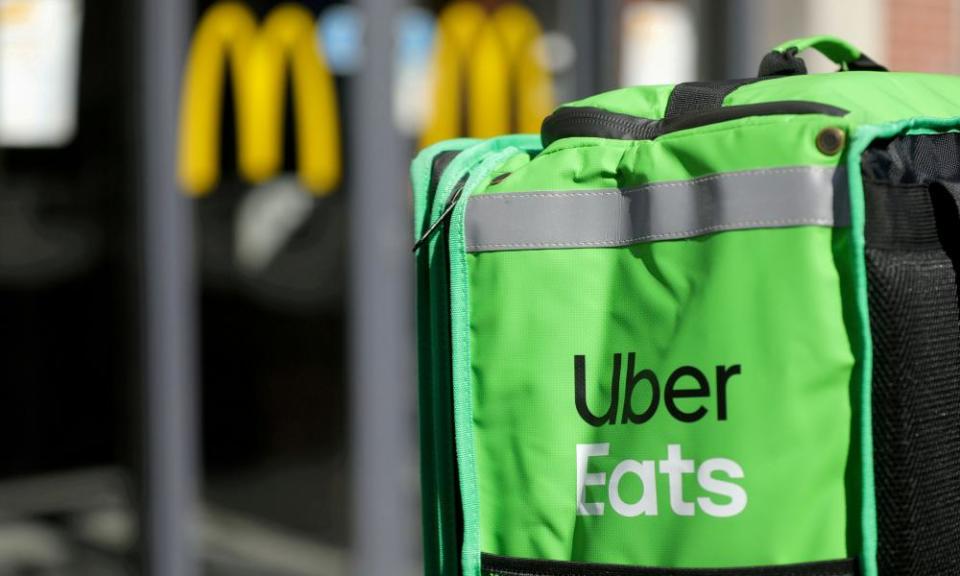Uber Eats riders earning as little as $5 for deliveries crossing multiple NSW suburbs

Uber Eats riders in Australia are earning as little as $5 for individual deliveries that cross multiple suburbs, as riders complain that their pay was cut by the global tech giant during the pandemic.
New data provided to Guardian Australia by riders has revealed pay rates as low as $5.01 for a nearly 4km trip.
One rider was paid $5.70 for a 5km trip that took 14 minutes – which does not include time spent waiting.
Another rider was paid less than $10 for a 23-minute trip that took them down Sydney’s busy Parramatta Road.
The rider earned $9.78 for the 23-minute delivery, which did not include time spent waiting for the food to be prepared, the time between jobs, or the time taken to travel to the restaurant.
Riders have previously told a New South Wales parliamentary inquiry that the time spent waiting for orders lowered their hourly rate of pay.
Another rider was paid $12.87 for a 27-minute trip.
The trip – from a grocery store to a home – spanned 15km, and crossed at least five suburbs, from Sydney’s inner west to south.
Related: Uber Eats rider died riding e-bike not approved for use in NSW, company confirms
Other riders made $5.01 for a 12-minute trip across 3.7km, $5.74 for a 14-minute trip across 5.2km, and $7.38 for a 17-minute trip across 7.2km.
Uber Eats and other companies like Deliveroo class their workers as independent contractors, rather than employees, meaning they are not entitled to award rates of pay. Gig workers are not paid a set hourly rate, but are paid for each delivery.
Rival food delivery company Menulog recently announced it would abandon the gig worker model and make all its workers employees within a “few years’ time”.
Menulog’s Australian managing director, Morten Belling, told NSW parliament that it would provide set hourly rates of pay and that this certainty for riders would benefit both employer and worker.
Belling said the company needed to do this to “meet its moral obligations” as an originally Australian-developed business.
Pay rates for Uber Eats riders vary by city, and are calculated depending on time taken and distance travelled.
A report commissioned by Uber between August and December found the average earnings for food deliverers was $21.55 an hour after costs – but only during meal times.
The report also found that 77% of Uber Eats delivery workers were ineligible for government support during the pandemic – mostly due to being recent migrants.
In response to questions, a spokesman for Uber Eats referred Guardian Australia to the report, prepared by global consulting company Accenture.
The report contained no data on lowest and highest ranges of hourly pay.
On Tuesday, the Fair Work Commission also ruled that a worker for rival company Deliveroo was an employee, not a contractor.
The commission found that Deliveroo regularly tracked its delivery riders and compared their times to identify slow riders. The worker, Diego Franco, was sacked for being too slow with his deliveries.
A spokeswoman for Deliveroo said it planned to appeal the decision and was “confident that riders are independent contractors”.
“We do not accept the premise upon which the decision was taken and do not believe this reflects how Deliveroo riders work with the company in practice,” she said.
“Riders have the absolute freedom to decide whether, when and where they work, and if they do go online they can decide how long to work and can freely reject any offer of work offered to them. Riders don’t need to provide personal service – they can and do use delegates to complete deliveries. Riders can and do work with multiple platforms, including competitors, at the same time – as Mr Franco did himself.”
The Deliveroo spokeswoman said the company would “appeal this decision to protect those freedoms”.
Previously, riders told the NSW parliament that pay rates dropped to $8 a delivery during the pandemic, because companies could reduce pay for their workers as demand surged for delivered food, and people lost their jobs and became gig workers.
Riders have also told Guardian Australia that they are under pressure to work faster due to companies tracking them.
On Tuesday, an Uber Eats spokeswoman responded to the finding against Deliveroo, saying that “not all online food delivery apps operate in the same way”.
Previous rulings of the Fair Work Commission and the full bench of the commission involving Uber Eats have said that Uber Eats workers are not employees.
However, in December last year, Uber settled a case before the full bench of the federal court on the same issue – thereby avoiding what would have been a landmark ruling on the status of gig workers.

 Yahoo Finance
Yahoo Finance 